Given that metropolitan Taipei is home to a sizeable tribe of metrosexuals, one would think that grooming and health services which cater to men would be booming. But when it comes to having a 90-minute treatment at a spa dedicated to men, reactions are mixed and tailor-made packages are few and far between. “Me, at a spa slathered in oil and mud? No, that’s too girly for a guy like me,” said a 30-year-old salesman who goes by the name Hsiao Yang (小楊) and whose girlfriend frequents spas for facials on a monthly basis.
Traditionally a women’s domain, day spas have long been seen by most males as no-go zones, an affront to masculinity, where naked, silken-skinned females are covered in green mud and daubed with essential oils. Yet, the female spa market is saturated and the men’s gradually changing consuming habits have spurred spa owners to turn their attention to male grooming.
While men-only spas are still in short supply, high-end establishments are adding treatments for men to their services. These establishments offer the spa-going male services ranging from aromatherapy and body scrubs to hot stone massage. Not much different than services specifically tailored for females.
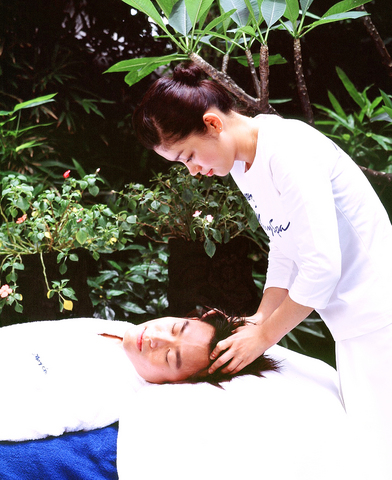
PHOTOS COURTESY OF MERRY SPA
But as a 60-minute to 90-minute treatment usually comes with a premium price tag ranging from NT$3,000 to NT$6,000 at the more luxurious urban retreats, male customers are entitled to treatments exclusively designed for their bodies and well-being.
To adapt to their new customers’ needs, some spas have focused on more male-friendly treatments. Well-established spas like Orient Retreat (登琪爾spa) and Being Spa pamper their clients with sports massage to relieve muscular tension and fancy treatments to combat the stresses and strains of modern living.
Among the establishments that have expanded services, Merry Spa (活髮美塑館) is one of the leading players in the market. Founded in 2001 when male spas were virtually nonexistent, the company was the first of its kind to develop special treatments for stressed-out males and introduce treatment rooms for men separate from other spa facilities frequented by women.
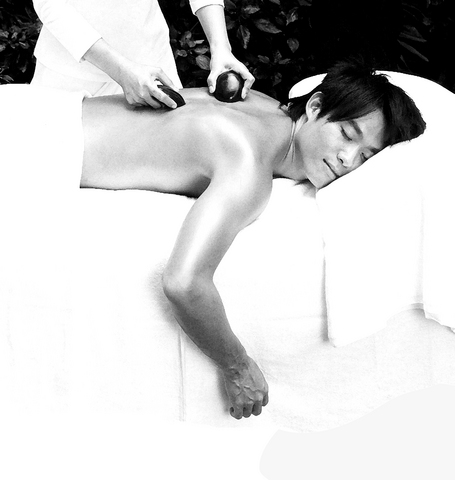
“Men now account for 30 percent to 40 percent of our customers, and the number is increasing. Most of our male clients are corporate managers and professionals who are under lots of stress and can hardly find time in their busy schedules to exercise,” said Karen Liu (劉凱倫), a therapist at Merry Spa’s flagship store on Dunhua South Road.
In the warmly-lit, scented space filled with high-tech gadgets, male customers are first subjected to a body composition and scalp analysis so licensed therapists and masseuses can arrange customized treatments.
Essential oils are mixed and used to protect the scalp and combat hair loss and dandruff. The spa’s highlight hair therapy is an holistic head-to-toe treatment that combines the stimulation of pressure points with hot stone and essential oil massages. Specially trained massagers are on hand to alleviate constipation and other gastrointestinal problems and there is a state-of-the-art massage water bed.
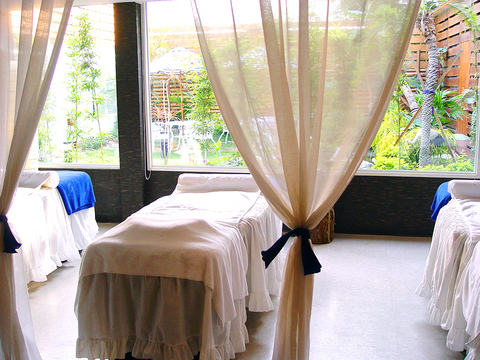
Many men first enter a spa at the behest of their partner, but are bewildered by the dazzling array of beautifying options available to females. “Most of our male customers are brought here by their wives or girlfriends. Once they understand how relaxing the spa experience can be, they are no longer afraid to return on their own,” Liu said.
For those who do frequent spas on their own, the stress relieving, scalp and digestion treatments are the mainstream choices, whereas only the most adventurous venture into the realm of manicures, pedicures and facials.
While the big spa chains still have a lot to do to emulate the comprehensive masculine experience offered by some of their European and US counterparts, a few men-only spas of a relatively moderate scale have quietly entered the nascent industry.
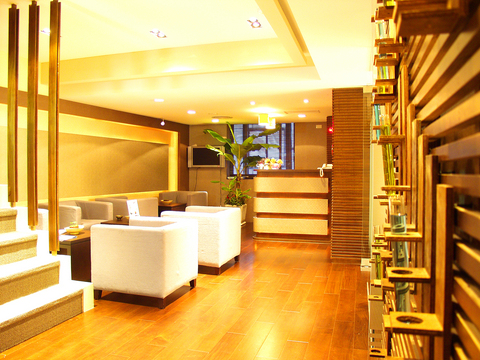
Opened last year in Ximending, So Young Men Spa (水漾甦活概念館) is a small spa that provides an intimate environment and services by masseurs.
So Young is masculine and appeals to men who are put off by the feminine decor and services offered by crossover spas. Simple, straightforward treatments are the order of the day.
“Over half of our customers are tourists, Japanese and Singaporean on business trips, and foreigners living in Taipei who are more open to the idea of men’s spas,” said spa manager Lin Hsu-yu (林旭裕). “Most of our local clients are white-collar workers aged 30 to 40.”
A large portion of patrons are deskbound workers who suffer from aches and pains caused by poor posture; body massage with essential oils is the most well-received option to relieve tension in the neck, shoulders or back. Customers can also pick up skin and body care products without feeling their masculinity is under siege.
The market potential, Lin said, is vast. But before men stampede to be pummeled and pampered, ingrained stereotypes and misperceptions about spa treatments need to be dispelled.
Merry Spa’s flagship store is located at B1/1F, 86 Dunhua S Rd Sec 1, Taipei (台北市敦化南路一段86號B1-1樓). Call 0800-026-588, toll-free, for other Merry spa locations and services. For more information on the spa services and treatments at So Young men spa visit www.soyoungmenspa.com.tw.

President William Lai (賴清德) has championed Taiwan as an “AI Island” — an artificial intelligence (AI) hub powering the global tech economy. But without major shifts in talent, funding and strategic direction, this vision risks becoming a static fortress: indispensable, yet immobile and vulnerable. It’s time to reframe Taiwan’s ambition. Time to move from a resource-rich AI island to an AI Armada. Why change metaphors? Because choosing the right metaphor shapes both understanding and strategy. The “AI Island” frames our national ambition as a static fortress that, while valuable, is still vulnerable and reactive. Shifting our metaphor to an “AI Armada”

When Taiwan was battered by storms this summer, the only crumb of comfort I could take was knowing that some advice I’d drafted several weeks earlier had been correct. Regarding the Southern Cross-Island Highway (南橫公路), a spectacular high-elevation route connecting Taiwan’s southwest with the country’s southeast, I’d written: “The precarious existence of this road cannot be overstated; those hoping to drive or ride all the way across should have a backup plan.” As this article was going to press, the middle section of the highway, between Meishankou (梅山口) in Kaohsiung and Siangyang (向陽) in Taitung County, was still closed to outsiders
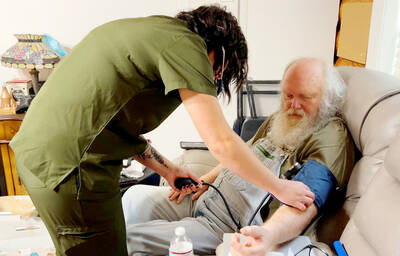
The older you get, and the more obsessed with your health, the more it feels as if life comes down to numbers: how many more years you can expect; your lean body mass; your percentage of visceral fat; how dense your bones are; how many kilos you can squat; how long you can deadhang; how often you still do it; your levels of LDL and HDL cholesterol; your resting heart rate; your overnight blood oxygen level; how quickly you can run; how many steps you do in a day; how many hours you sleep; how fast you are shrinking; how

“‘Medicine and civilization’ were two of the main themes that the Japanese colonial government repeatedly used to persuade Taiwanese to accept colonization,” wrote academic Liu Shi-yung (劉士永) in a chapter on public health under the Japanese. The new government led by Goto Shimpei viewed Taiwan and the Taiwanese as unsanitary, sources of infection and disease, in need of a civilized hand. Taiwan’s location in the tropics was emphasized, making it an exotic site distant from Japan, requiring the introduction of modern ideas of governance and disease control. The Japanese made great progress in battling disease. Malaria was reduced. Dengue was